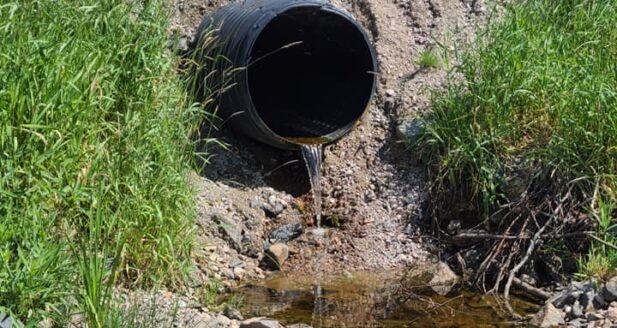
Drought Effects on MB Hydro Operations
By Mathew Scammell
Drought conditions across the Prairies have been causing far-reaching implications in recent years (1). Water levels flowing into Southern Manitoba are at a 40-year low (2), and have been impacting agriculture, drinking water sources, and recreation. These impacts are also being felt by Northern Manitoba as well, with dry conditions also increasing the frequency of forest fires and reducing the ability of Manitoba (MB) Hydro to produce electricity. In recent reports, MB Hydro is now forecasting a large multimillion dollar deficit due to the lack of water available for its hydroelectric mega-dams (3).
Though the drought may be a natural phenomenon, scientists and activists have been saying for decades that governments must start preparing for these kinds of situations to occur more often due to climate change, which is increasingly being called a crisis. Despite these advanced warnings, the Manitoba Government has done virtually nothing to prepare our province for this climate emergency. While the provincial government was busy fighting the federal carbon tax scheme in court (which it ultimately lost) (4), emissions for the province were and are continuing to rise (5).
At the core of energy planning for this province is MB Hydro, who is charged with ensuring our entire population of 1.3 million people is able to meet basic heating and electricity needs in an affordable, accessible, and sustainable manner. Despite the gigantic responsibility, this public utility has been utterly negligent when it comes to planning for the future. MB Hydro still has no plan for decarbonizing our fossil fuel (natural gas) dependent heating infrastructure (6), and continues in a direction of relying solely on building destructive mega-dams in order to produce electricity.
In terms of energy diversity, the Province of Manitoba has none. Much could be said about the statement “96% of the electricity we produce is clean, renewable power” (7) consistently touted by MB Hydro, in terms of whether or not the word ‘clean’ is accurately used, but what should also be questioned is the reliance on the term ‘renewable’. If 96% of our electricity, essentially all of it, depends upon one resource being available – then we are in dire need of diversification. And if that one resource is the availability of flowing water, it must be wondered how seriously top-level bureaucrats and politicians have been considering the very real present-day and increasing severity of future impacts from climate change on our provincial ability to produce electricity.
Due to the low availability of water province-wide, MB Hydro has been holding it back wherever possible and reducing flows out of their control structures and generating stations, in order stabilize production over the winter. This tactic has come at a cost to northern communities that rely on their lakes and rivers for food and water. Cross Lake has been especially affected, with MB Hydro holding back as much water as possible at the Jenpeg Generating Station. About the situation, Rita Monias says: “We have to tell people these gates are closed all summer, every summer and we see now the excuse and propaganda of “An Act of God”, God doesn’t come and close those gates every summer, it is done by man, corporate bullies.” MB Hydro knows that their actions have consequences, and yet continue to sacrifice the well-being of Indigenous communities for the benefit of southern, non-Indigenous communities. According to their own data, MB Hydro has more than halved the amount of water flowing into Cross Lake through Jenpeg – from 79,428.6 ft3/s (Nov.18, 2020) to 31,963 (8) ft3/s (Nov.18, 2021) (8). This kind of community prioritization, rooted in a colonial and racist history, would not be necessary with a diversity of energy sources – allowing a lower amount of hydroelectricity to be generated without compromising the entire system.
MB Hydro’s operations have long been destructive for Indigenous communities, cultures, and economies, aquatic ecosystems, and forest habitats. These impacts need to be seriously weighed against the benefits of increasing the provincial dependence on a ‘renewable’ resource so sensitive to the impacts from climate change. Diversifying the energy mix with a healthy dose of wind and solar is not only a reasonable demand for improving climate resilience, it also very well could cost less. Environmental harms from flooding have cost Northern Manitoba communities dearly in terms of social and economic impacts (9). Financially, the billions of dollars of public funds being poured into less-than-necessary mega-dams and the accompanying hundreds of kilometres of transmission lines could be better utilized elsewhere. Wind and solar projects can be developed in and around Winnipeg, the exact place consuming the majority of the energy being produced by northern mega-dams – lessening the amount of infrastructure required to transmit the electricity. If droughts are forecasted to be more common in the future, a very different direction needs to be taken by MB Hydro and the Manitoba Government.
1.https://www.cbc.ca/news/canada/manitoba/manitoba-drought-winter-snowfall-1.6239769
2.https://www.cbc.ca/news/canada/manitoba/manitoba-hydro-deficit-2022-1.6244600
3.https://www.winnipegfreepress.com/local/drought-forecast-to-impact-hydro-2021-22-bottom-line-575714422.html
4.https://www.cbc.ca/news/canada/manitoba/carbon-tax-challenge-no-appeal-1.6252375
5.https://www.gov.mb.ca/climateandgreenplan/climatechange.html; https://www.winnipegfreepress.com/arts-and-life/life/greenpage/manitoba-greenhouse-gas-emissions-keep-rising-569996832.html
6.https://www.winnipegfreepress.com/opinion/editorials/ipcc-report-signals-code-red-for-planet-earth-575064272.html
7.https://www.hydro.mb.ca/corporate/facilities/
8.https://www.hydro.mb.ca/corporate/facilities/water_levels/
9.https://thenarwhal.ca/state-of-erosion-the-legacy-of-manitoba-hydro/

